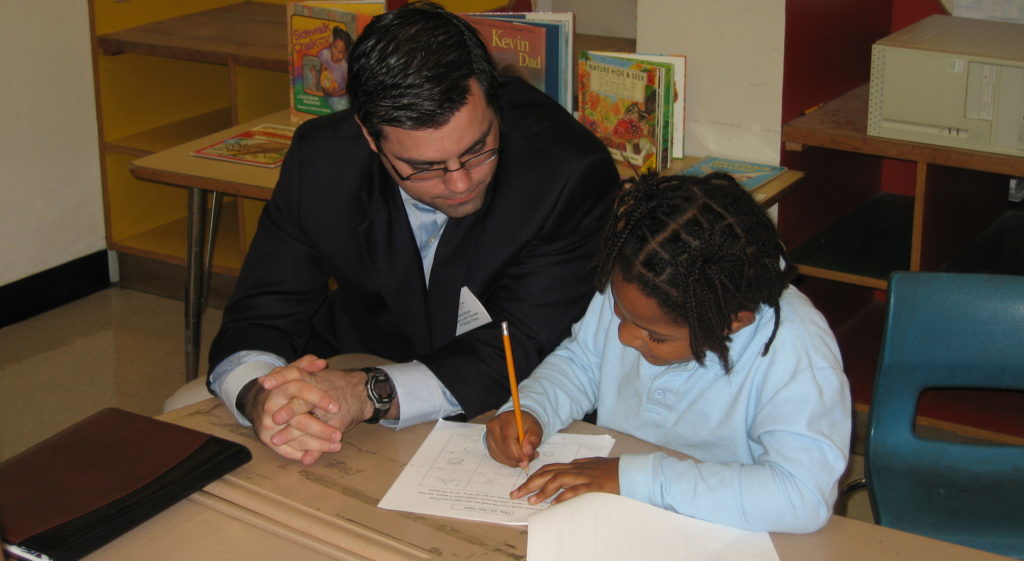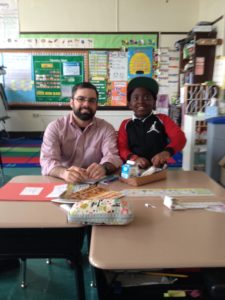
What do Boston Partners in Education and a two hundred year old financial services firm have in common? They both place serious emphasis on community partnerships. For nearly 20 years Boston Partners in Education and Brown Brothers Harriman (BBH) have worked together to benefit students in Boston’s public schools.
“I am so pleased to see that this program continues to thrive,” said Page deGregorio, Vice President of Community Relations for BBH, who volunteered through the Power Lunch Program when this relationship began. “Volunteers can see the impact they are making on young students’ lives between October and June, but the impact extends beyond the school year. Not only do kids’ reading skills improve, but their confidence and ability to focus on other subjects increases, too.”
Whether the student-mentor pairs are reading a story, creating one or working out the answer to a particular question of the day, the lunch hours they share make a lasting impact. Each student’s needs are different and each mentor has something unique to offer. Being an academic mentor isn’t just about the material you are studying. More often it is about finding out what the student needs in order to succeed.
Page reflected on her experience with one exceptional student who seemed momentarily overwhelmed by the pressure to succeed. “One of my Power Lunch students and I found excitement with each book we read. One day, however, I arrived at the McKay School to find my student in tears. When I asked her what was wrong, she leaned toward me for a hug and explained ‘My mother took away my dolls and told me that I needed to study harder.’ I knew how important education was to this girl’s mother. She had instilled the value of learning, college and having a career into her child early on in life. Her daughter WAS a focused student, but there was plenty of time to work toward college and limited moments to be a kid.
“I wanted to support this working mother’s long-term goals for her daughter, while making learning fun. I found dolls that accompanied the Madeline series of books. ‘Madeline‘ and friends came to that second grade classroom to read with us, act out the stories and even help us create new tales. Occasionally, other characters would make appearances during our lunch sessions,” recalled Page.
Page also shared with us that the very same student she had played dolls with over a decade ago had recently contacted her through LinkedIn. The message to Page read: “I am not sure if you will remember me as it was so long ago. I am 23 years old now, but I remember we used to read Madeline books, and you gave me the dolls as a gift. We had a very special connection and I have never forgotten you. I have wanted to reconnect with you for so long but I didn’t know how. I just wanted to say thank you for inspiring me and cultivating in me the love of reading. I hope to hear from you soon.”
Page and her student have since reconnected and are enjoying their renewed friendship. They share career and personal stories and occasionally reflect on Madeline and friends. For someone in the financial services industry, there is no better return on investment than a message like that! It appears the time these two spent together produced dividends that have lasted a lifetime.
Another long-time lunchtime volunteer is Brandt Brisson, Vice President in Systems at BBH. Brandt participated in Power Lunch at his former employer and was happy to find that BBH also participated in the program. In fact, he and his wife were expecting their first child the year that Brandt joined BBH; Power Lunch was a great way to practice reading with children.

BBH volunteer Brandt Brisson with his Power Lunch student, Isiah.
“No matter how busy my day gets, I never find myself saying ‘Wow. I wish I could get that hour of time back.’ I have always felt that something good has come out of the time spent at the school,” Brandt shared. He was also particularly motivated by the critical role that early reading proficiency plays in a child’s success through school and for timely graduation.
“It is easy to fall behind on any subject, especially reading. It might not seem like a big thing at the time, but at a young age it is critical. You can’t always just pick it up again. Delays at a young age follow you all the way through school.”
While Brandt cited academic gains as being critical to the success of the students – and of the program itself – both he and Page acknowledge that many of the students they worked with benefitted from social improvement, too.
“Education is the cornerstone of overall success, so supporting educational programs that promote academic success, independence and economic sustainability are a focus of the community work done through all of our offices,” notes Page. “Early literacy is critical. We see the results as we work with students through other tutoring and mentoring programs around the City.”
BBH’s community engagement program encompasses all aspects of education from kindergarten to college, creating a generation of young individuals equipped with the skills to continue their learning and to give something back to the next generation. Perhaps this is already taking shape.
“We see students who start in Power Lunch in elementary school. They go on to participate in leadership programs for fifth and sixth grade students, and then into educational and personal development workshops for high school students. These students are going on to high school and coming back as BBH summer interns,” Page explains. Utopia for Page would be seeing Power Lunch students working full time at BBH one day and volunteering with colleagues at their own elementary schools.
